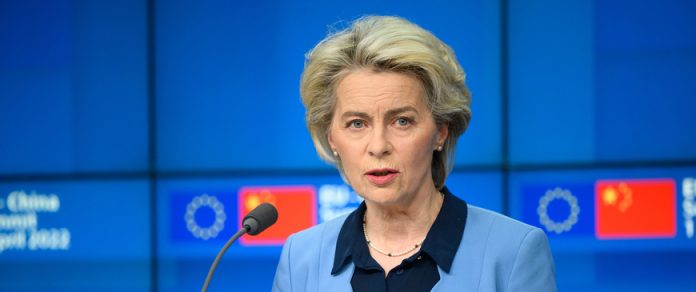The European Commission on Wednesday (24 January) formally unveiled plans to strengthen the EU’s economic security, in a bid to counter China’s influence on the European bloc’s economy, Euractiv reports.
The so-called economic security package comes after a Commission proposal last June to give Brussels greater powers to oversee foreign direct investment (FDI) in the EU, as well as outbound investments by European companies.
It is also part of Commission President Ursula von der Leyen’s broader initiative to “de-risk” China, first announced in March 2023.
Commission executive vice president Margrethe Vestager said at a press conference announcing the new plans:
“It’s a very simple observation that lies behind this strategy: that there is fierce competition worldwide for the technologies that we need the most. And in this competition, Europe cannot just be the playground for bigger players. We need to be able to play ourselves.”
The new package calls for “more effective EU controls” on exports of “dual-use” goods (i.e. civilian and military), in addition to enhanced scrutiny of FDI in the EU and closer coordination between member states to identify possible risks associated with foreign investment. It also calls on the European Council to recommend concrete measures to “strengthen research security” across the bloc, according to Euractiv.
Vestager’s deputy Valdis Dombrovskis said that while the Commission will consult with member states and other stakeholders to “define parameters” for controlling outbound investment, the Commission itself advises to “focus on a narrow set of sensitive technologies” including artificial intelligence, advanced semiconductors, quantum and biotechnology industries.
Alicja Bachulska, a research fellow at the European Council on Foreign Relations (ECFR), said the package represented an “important step” forward, but criticised it for being “vague”. She believes the proposal largely fails to take into account its negative potential impact on business. Bachulska said:
“If these policy changes are to be taken seriously, they will incur some costs. And while these costs might be necessary for the EU to retain its economic competitiveness over the long run, from the short-term perspective, they will raise tensions between some business communities and Brussels.”
Bachulska’s analysis was confirmed by a statement issued the same day by Ulrich Ackermann, head of the foreign trade office of the German Engineering Industry Association (VDMA). He said:
“European investments abroad do not jeopardise public security and order in the EU.”
He added that the new measures “will make export controls more complicated and confusing, even more bureaucratic for the companies concerned and will not lead to improvements.”
Sander Tordoir, a senior economist at the Centre for European Reform, also praised the overall spirit of the package. However, he criticised the package for offering “too much of the same soft coordination that has let us down so far.” He said:
“I think directionally, it makes sense what they’re doing. They’re focussed on the right fault lines in the toolkit, like export controls and FDI screening, where Europe has been most vulnerable, fragmented. [But] they need to be more aggressive and properly “Europeanise” this so that China cannot lean on individual member states to get the EU to fracture.”
Tordoir also pointed to the US success in pressuring the Netherlands last year to restrict the sale of advanced chips to China as another prime example of why more EU coordination is needed in defining export controls. He said:
“The US of course remains an ally, but sometimes our interests diverge. I think having the whole EU behind these kinds of initiatives would be much better.”
Tordoir also noted that the Commission seems to have “backed off a bit” from its tougher centralisation proposals that were published last year, Euractiv reports.
He attributed the move to the fact that 2024 is an election year and that von der Leyen is likely being careful not to deprive some member states – especially Germany, whose closest trading partner is China – of the ability to determine their own economic security strategy. He said:
“I think a short-term tactical political view probably won the day.”
The new EU plan comes at a time of growing economic fragmentation. At the World Economic Forum in Davos last week, European Central Bank President Christine Lagarde repeatedly emphasised that countries – especially those in the EU – are now focusing on “security” rather than “efficiency” in their relations with other states. On Wednesday, Commission Executive Vice-President Dombrovskis echoed her words:
“The last few years have taught us some hard lessons about the risks of excessive dependence. To preserve the EU’s openness we must address these risks.”
